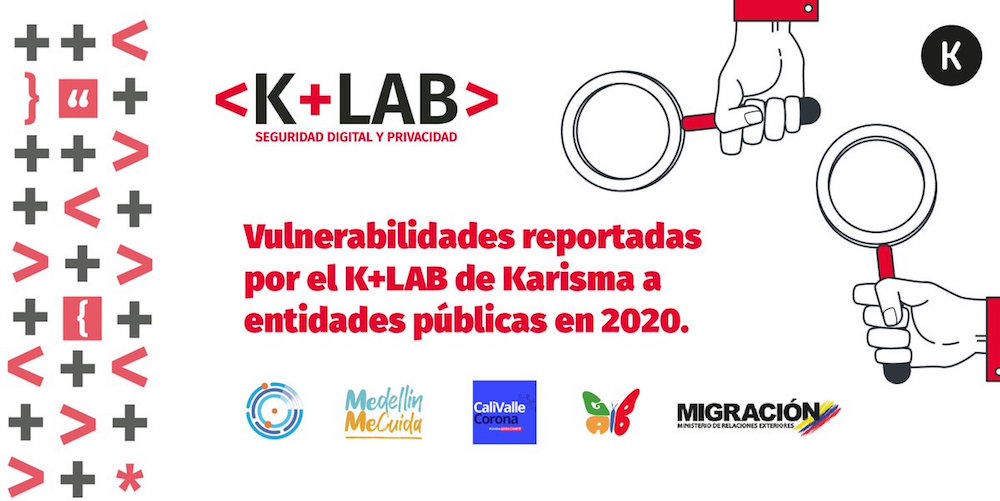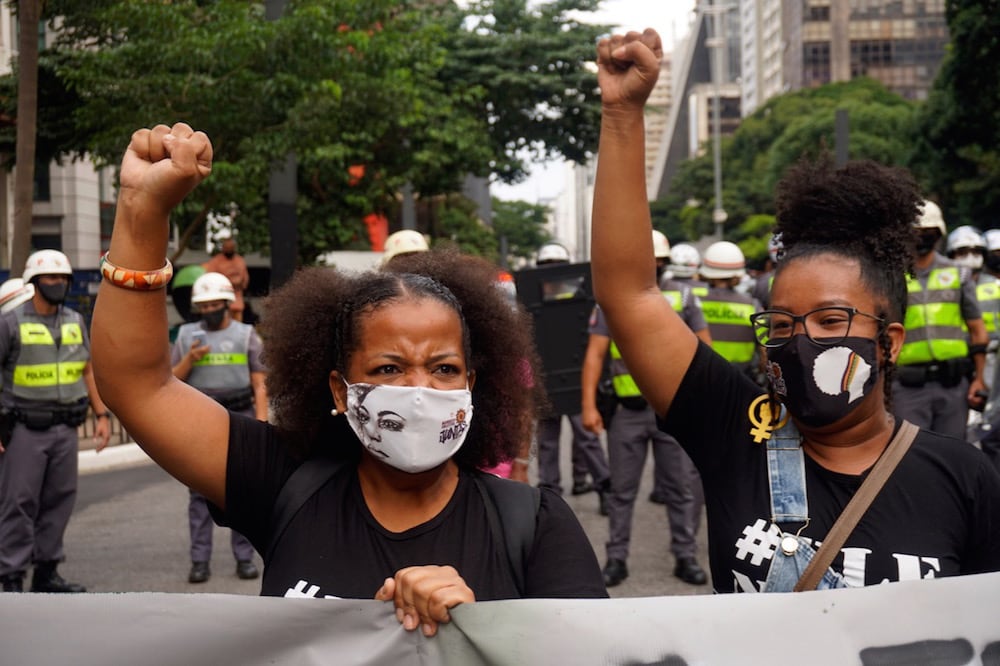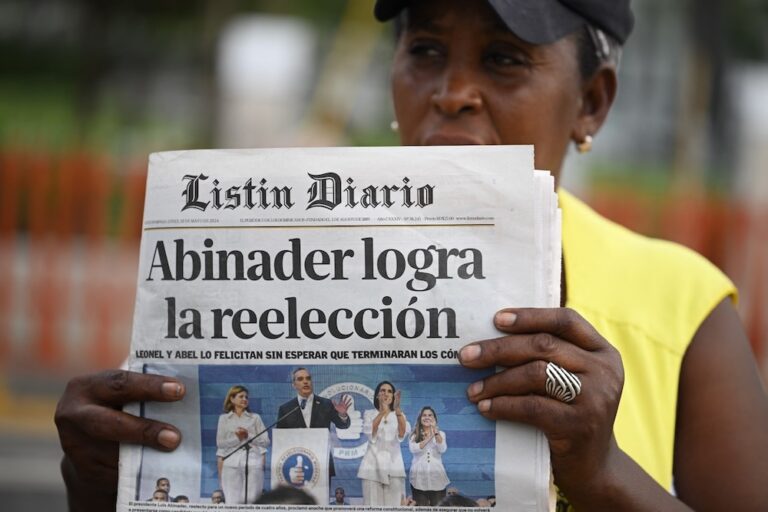January 2021 in the Americas: A free expression round up produced by IFEX's Regional Editor Paula Martins, based on IFEX member reports and news from the region.
Identifying vulnerabilities in ‘digital solutions’ developed in the fight against COVID
In late January, IFEX member Fundación Karisma launched a report that documents and systematizes the vulnerabilities found and reported by the organisation’s K+LAB Digital Security and Privacy Laboratory during 2020.
According to the report, both the national and regional governments in Colombia reacted to the COVID pandemic with ‘digital solutions’ to complement other measures – mainly restrictions on movement and circulation. Apart from research into whether these technological solutions are effective, the fact that they revolve around the massive collection of personal data and data generated by devices (such as location on mobile phones) led K+LAB to focus on monitoring these applications. The objective was to verify if the processing of the collected data was done in a responsible and secure manner.
K+LAB’s analysis indicates that not only is there a problem in the design and implementation of the applications, but there is a deeper cause of concern with the manner and methods in which public institutions develop them. According to Karisma, work is needed to ensure that the development of systems that manage personal data is not taken lightly – quality controls should be strengthened, risk management methodologies adopted, and clear incident response and threat models should be implemented.

Threats and political violence against Black and transgender city councillors
One of IFEX’s members in Brazil, ARTIGO 19, has been calling attention to the intensive online harassment and threats against Black and transgender members of the municipal legislature in Sao Paulo. The attacks range from online gender-based violence to firing shots against the residence of one of the councillors. ARTIGO 19 shares data from research carried out during the 2020 elections that points out that 78% of Black women candidates reported having faced attacks in the runoff to the polls. This violence did not cease with the announcement of results. Several newly-elected candidates received death threats, yet were not offered adequate responses or protection to ensure their lives and safety.
580 attacks against a “good for nothing” media
In late January, IFEX member Reporters Without Borders (RSF) released an overview of the attacks they had monitored against the Brazilian press during 2020. According to the group, a total of 580 attacks were registered.
RSF also called attention to the kind of discourse and tone used by the Brazilian president Jair Bolsonaro to refer to the media: “good for nothing”; “worse than garbage because garbage is recyclable”; “useless press”. The president and his sons were responsible for 118 of those 580 attacks documented by RSF.
Bolsonaro also continues to accuse the media of exaggeration in their coverage of COVID-19: “The press is responsible for the panic in the country and the loss of lives during the pandemic, a national disgrace.”
On 2 February, Brazil reached 225,099 deaths and 9,229,322 confirmed cases, according to official sources. The Johns Hopkins Coronavirus Resource Center points out that Brazil is second in the world in terms of total number of deaths. These numbers, and not the media coverage of the extremely poorly handled crisis in the country, are in fact an international disgrace.

A fact-checking alliance with a focus on indigenous and vulnerable groups
A new Peruvian media coalition will engage in fact-checking to combat false information during the electoral campaign ahead of general elections scheduled for April 2021 in the country. The initiative has been named Ama Llulla – ‘don’t lie’, in Quechua. The network will privilege the production of audio content, especially podcasts, that could be replicated by radios across the country. Videos and visual content will also be produced to target urban audiences.
This collaborative journalism initiative brings together Ojo Publico, IDL-Reporteros, La Mula, Útero, Convoca, El Filtro, Sudaca, Ideele Radio, El Búho, as well as several regional media outlets. The objective is to provide checked news to the most vulnerable populations, including indigenous peoples.
A Code of Conduct for Venezuelan NGOs
This January, a number of leading Venezuelan civil society organisations launched a Code of Conduct for the sector. They decided to adopt common standards and principles, which include non-discrimination; gender equality; sexual diversity; prevention of and accountability for sexual harassment; respect for the environment; free and accessible services; autonomy in relation to political, private, and state entities; transparency; and no violence. IFEX-ALC member Espacio Público are part of the initiative.
Cuban activists under distress
International IFEX member ARTICLE 19 reported a wave of attacks against journalists and human rights defenders during a demonstration in front of the Ministry of Culture in Cuba. The attacks came from the National Police and the Department of State Security in Havana. A number of individuals were detained and later released without charges. Five people reported being beaten during the attacks, and of these, two were women who said that they were also sexually assaulted by PNR agents, under the pretext of searching for tape recorders in their genitals. On 29 January, IFEX member the Committee to Protect Journalists (CPJ) also reported internet disruptions and affirmed that authorities have been imposing such restrictions in order to obstruct the spread of information about protests.
Mexicans’ personal data for sale
In late January, Mexican IFEX member R3D reported that three databases with alleged registrations of customers of the BBVA and Santander banks, as well as one made up of users of the Mexican Institute of Social Security (IMSS), were put up for sale on the black market. BBVA’s database allegedly has three million entries, Santander’s one million, and the IMSS database has 42 million entries containing the personal data of Mexicans, including addresses, phone numbers, national taxpayers numbers and numbers of their bank cards.
This new development follows the news of other databases being sold on the Mexican black market, including those of companies such as Coppel, Banamex and Movistar, as well as state agencies including the Federal Electricity Commission, the National Electoral Institute, the Institute of Security and Social Services of State Workers, and the Institute of the National Housing Fund for Workers, among others.
R3D recalls that these incidents are a reminder of the duty of companies and government entities to safeguard personal data under their control. Their inability to comply with their obligation to protect their users’ and customers’ data is especially concerning in view of a new government project that aims to create a centralized ‘mega database’ known as the National Mobile Phone Users Registry, which would include biometric data of all mobile users in the country.
You can learn more about the risks of such a proposal in R3D’s analysis here.
New and Noteworthy + Opportunities:

PEN America has launched a Safety Guide for Artists. The publication covers issues such as defining and understanding risk, preparing for threats, fortifying digital safety, documenting persecution, finding assistance, and recovering from trauma. The document contains a number of concrete and targeted tips. Check out the full publication here.
ARTIGO 19 has launched a free online course on Environmental Democracy. Focusing on the Escazú Agreement – a regional treaty drawn up in 2018 to address environmental crimes and violations against defenders of the land and the environment – the course will address the four ‘axes’ of the Agreement: access to environmental information, mechanisms for social participation and mobilization, protection and security of environmental activists and defenders, and access to justice. Further information and registration here.
This January, the Fundación para la Libertad de Prensa (FLIP) released a new set of Recommendations to the press when covering public demonstrations. The document contains tips that have been updated according to new regulations adopted in Colombia on the use of force by security forces. The document contains, for example, tips on how to cover protests during the COVID-19 pandemic, recommendations on digital security, and some resources concerning where to find help in case of emergencies.
The Government of Canada is planning to update the country’s Privacy Act. A public consultation is currently open to discuss key priorities to be addressed, considering that the legislation is now 40-years old. IFEX member OpenMedia has made a selection of some of the most important questions to facilitate participation by those interested in contributing to the debate.
Feeling the weight of our troubled pandemic times? You should take care of your mental health! Check the International Journalists Network’s (IJNet) Toolkit – available in English, Spanish and Portuguese, among other languages.



